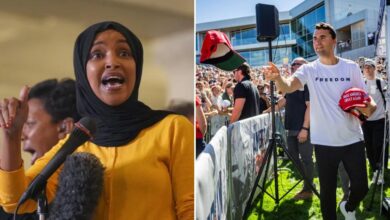Cracker Barrel eliminates its DEI web page, removes LGBT references

Cracker Barrel has dismantled its diversity, equity, and inclusion programs and scrubbed Pride messaging from its website in the wake of a bruising logo controversy that drew fire from conservatives and President Donald Trump.
The Tennessee-based chain eliminated DEI team positions and removed policies once highlighted on its website, Fox Business reported.
“The company does not have DEI team-member positions or DEI quotas/requirements,” a spokesperson said.
“It hires, promotes, and rewards individuals based only on skills and performance—full stop.”
The chain also deleted a page dedicated to Pride and stripped references to LGBTQ+ employee resource groups. A company representative described the removals as clearing “out-of-date content.”
The retrenchment comes after a summer of turmoil over branding. In mid-August, Cracker Barrel unveiled a minimalist logo that removed its iconic “Uncle Herschel” figure and the phrase “Old Country Store.”
Executives also touted a plan to modernize 660 restaurants with sleeker interiors aimed at younger diners.
The rollout triggered swift outrage online. Longtime patrons denounced the redesign as “generic” and “brand suicide” while conservative commentators accused the company of abandoning its nostalgic, country roots.
Within weeks, Trump blasted the new look in a Truth Social post, writing: “Cracker Barrel should go back to the old logo, admit a mistake based on customer response and manage the company better than ever before.”
The backlash wiped nearly $100 million off Cracker Barrel’s market value.
By early September, the chain capitulated. The text-only logo was scrapped, the Herschel illustration reinstated and remodeling efforts shelved after only four test locations.
“The vintage American you love will always be here—the rocking chairs on the porch, our fireplaces and peg games, unique treasures in our gift shop, and antiques pulled straight from our warehouse in Lebanon, Tennessee,” the company said.
Last week, Trump posted a 33-second, AI-generated video to X on Thursday that showed him digitally inserted into Cracker Barrel’s classic logo.
Chief executive Julie Masino admitted missteps in a CNBC interview, saying the company “could have done a better job” gauging customers’ attachment to the traditional logo.
Cracker Barrel pivoted to promoting its core identity.
“TODAY, you can go to Cracker Barrel and know that every biscuit was hand-rolled and baked fresh that day. We were built on biscuits,” the chain posted on X.
The reversal reassured investors. Cracker Barrel stock rebounded once the old branding was restored and management promised to stick with tradition.
Analysts called the episode a case study in the risks of tampering with brand heritage.
The controversy echoed Bud Light’s sales collapse after its Dylan Mulvaney promotion, showing how consumer backlash amplified by politics can upend corporate strategies.
On Reddit, design forums mocked the short-lived rebrand as “a case study in how not to rebrand.” Conservative influencers online hailed the restoration as a win for “real America.”
The chain, founded in 1969, operates more than 660 restaurants nationwide, heavily concentrated in the South and Midwest. It has long relied on older and rural customers who prize its nostalgic appeal.
Masino has not announced new branding initiatives since the reversal. In a statement, the company said it was “listening to our guests” and committed to preserving the identity customers expect.
Credit to Nypost AND Peoples



